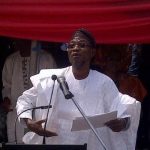Aregbesola explains Opon Imo concept at Harvard
Osun State Governor Rauf Aregbesola has explained the rationale behind the decision to give digital tablets to secondary school pupils in Osun.
He said the concept is to ensure access to knowledge and improve the performance of pupils.
Opon Imo, a computer tablet, is to be distributed to about 150,000 secondary school pupils next month.
The governor spoke while delivering a lecture, entitled, Nigeria: The Development Challenge, at the prestigious Weatherhead Centre for International Studies of the Harvard University, Cambridge, the United States.
The lecture was part of activities lined up for his one week working visit to the United States.
Aregbesola said: “As part of our education reform, starting from next month, we will introduce Opon-Imo, an iPad-like computer tablet, which is a smart electronic teaching aid, to our secondary school pupils.
“This tablet is pre-loaded with the 17 subjects covered by the West African Senior Secondary Certificate Examinations (WASSCE) in the form of lesson notes and textbooks. It also contains six extra-curricular subjects, such as sex education, civic education, Yoruba history, Yoruba traditional religion, computer education and entrepreneurship education.
“Ten years’ past questions and answers to be provided by the Joint Admission and Matriculation Board (JAMB) and the West African Examinations Council (WAEC) would be included in the tablet.
“The tablet has bridged the gap of carrying books in sacks, wear-and-tear and the need for replacement. It also provides ready learning tools. Opon Imo has no internet connectivity and does not interface with other devices in order not to distract pupils. Knowing that power is still a problem, especially in rural areas where there is no electricity, a solar charger will be supplied with it.
“Through this initiative, the state government seeks to expose senior secondary school pupils to information technology at an early age. Our investment in computer for secondary school pupils was borne out of our conviction that the future belongs to the digital age and it will be disastrous if our youths are not prepared for this.”
Lamenting the country’s slow pace of development, Aregbesola said the colonial history of Nigeria could not be exonerated from its present predicament.
He said for the country to get out of its present predicament, it must understand where it came from and how it got here.
To do this assessment, Aregbesola said the country and its leaders must return to the colonial period, when the foundation of its under-development was laid.
He said: “The real fruits of development are the strength of state institutions for law enforcement, transportation, economic production, defence, knowledge production, arts and entertainment as well as cultural (and national power) projection.
“The challenge of development, therefore, is how a nation strengthens its institutions and mobilises its human resources to produce the fruits, not necessarily on the scale of the United States, but on that which will guarantee good life for its citizens.
“To get out of our present predicament we must understand where we came from and how we got here. To do this, we must begin from the beginning.
“Hence, it is well worth repeating the over-emphasised point that the foundation of Nigeria’s under-development was laid in its colonial history.
“It was, therefore, the case that, at independence, what was handed over as a country was such a political and administrative liability that its consequences soon began to hunt and hurt its human constituents.
“These consequences hampered the country’s capacity to leverage its widely acclaimed ‘huge potential’ for development. The numerous dimensions of our development challenge have been amply articulated.”
He said Nigeria is a developing country so far as the extant parameters of income per capita, life expectancy, the rate of literacy and so on are low, compared with countries designated as developed.
Aregbesola identified some of the nation’s challenges as ethnic differences, structurally deficient federalism, prolonged military rule, religious and sectarian problems as well as inept leadership.
Above all, he said military incursion in politics greatly affected the nation’s social institutions.
The governor said: “Worse still, military rule in Nigeria has enthroned and embodied everything that was antithetical to the development of the country.
“Destructive dictatorship; repression of opposing but qualitative input into the political process; institutionalisation of pervasive corruption; devastation of the economy; spread of mass poverty; alienation of the population; militarisation of the polity and perpetuation of divisions in the society are some of the damages inflicted by military rule on the country.”
He said Osun State has its peculiar challenges, but unemployment is common to all states in Nigeria.
Aregbesola said his administration intervened by employing 20,000 youths within its 100 days in office.
He said: “Critical state intervention of this nature is necessary. This intervention re-inflated the economy of the state with immediate impact in every sector.
“The policy was so successful that the World Bank commended us, asked to understudy it and recommended it as a model of youth engagement and mass employment for other states.”
Source: http://thenationonlineng.net/new/news/aregbesola-explains-opon-imo-concept-at-harvard/


